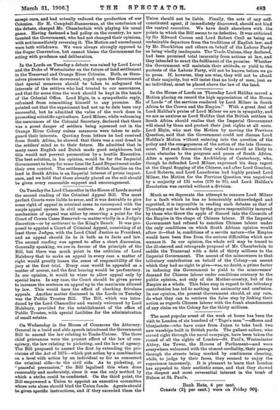On Wednesday in the House of Commons the Attorney- General
in a lucid and able speech introduced the Government Bill to amend the law relating to Trade-Unions. The three chief grievances were the present effect of the law of con- spiracy, the law relating to picketing, and the law of agency. The Bill proposed to amend the first by extending the pro- visions of the Act of 1875—which put action by a combination on a level with action by an individual so far as concerned the criminal side—to the civil side. As to picketing, or "peaceful persuasion," the Bill legalised this when done reasonably and moderately, since it was the only method by which a strike could be conducted. On the third point, the Bill empowered a Union to appoint an executive committee whose acts alone should bind the Union funds. Agents should be given specific instructions, and if they exceeded them the Union should not be liable. Finally, the acts of any self.. constituted agent, if immediately disavowed, should not bind the central executive. We have dealt elsewhere with the points in which the Bill seems to ns defective. It was criticised by Sir Edward Carson and Lord Robert Cecil as being an undesirable departure from the traditions of English law, and by Mr. Shackleton and others on behalf of the Labour Party as being wholly inadequate. The Trade-Unions, they declared, had been promised total immunity from actions at law, and they intended to exact the fulfilment of the promise. Whether the Government will maintain their attitude, or yield to the protests of the Labour Party, will not be known before we go to press. If, however, they are wise, they will not be afraid of their majority, but will insist that no body of men, just as no individual, must be placed above the law of the land.










































 Previous page
Previous page